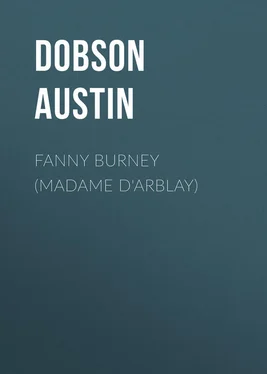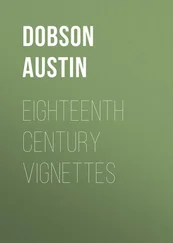Austin Dobson - Fanny Burney (Madame D'Arblay)
Здесь есть возможность читать онлайн «Austin Dobson - Fanny Burney (Madame D'Arblay)» — ознакомительный отрывок электронной книги совершенно бесплатно, а после прочтения отрывка купить полную версию. В некоторых случаях можно слушать аудио, скачать через торрент в формате fb2 и присутствует краткое содержание. Издательство: Иностранный паблик, Жанр: foreign_antique, foreign_prose, на английском языке. Описание произведения, (предисловие) а так же отзывы посетителей доступны на портале библиотеки ЛибКат.
- Название:Fanny Burney (Madame D'Arblay)
- Автор:
- Издательство:Иностранный паблик
- Жанр:
- Год:неизвестен
- ISBN:нет данных
- Рейтинг книги:5 / 5. Голосов: 1
-
Избранное:Добавить в избранное
- Отзывы:
-
Ваша оценка:
- 100
- 1
- 2
- 3
- 4
- 5
Fanny Burney (Madame D'Arblay): краткое содержание, описание и аннотация
Предлагаем к чтению аннотацию, описание, краткое содержание или предисловие (зависит от того, что написал сам автор книги «Fanny Burney (Madame D'Arblay)»). Если вы не нашли необходимую информацию о книге — напишите в комментариях, мы постараемся отыскать её.
Fanny Burney (Madame D'Arblay) — читать онлайн ознакомительный отрывок
Ниже представлен текст книги, разбитый по страницам. Система сохранения места последней прочитанной страницы, позволяет с удобством читать онлайн бесплатно книгу «Fanny Burney (Madame D'Arblay)», без необходимости каждый раз заново искать на чём Вы остановились. Поставьте закладку, и сможете в любой момент перейти на страницу, на которой закончили чтение.
Интервал:
Закладка:
The little family at Poland Street, thus suddenly left motherless, must have been an exceptionally interesting one. Esther, or Hetty, the eldest, is described as extremely beautiful, and possessed of that fortunate combination, good sense, good humour, and an abundant love of fun. She was besides remarkably musical, and according to the Gentleman’s Magazine , was wont to astonish her father’s guests, at a very early age, by her skilful instrumentalism. James, the eldest son, who, at the age of ten, entered the Navy under Admiral Montagu as a nominal midshipman, was an unusually bright and manly lad, full of vivacity and high spirits. When at school in his Norfolk home, he had been taught by Eugene Aram. He could recall how that “melancholy man” would pace the playground talking of strange deeds to the elder boys; and he remembered well the memorable night in August 1758 when
“Two stern-faced men set out from Lynn,
Through the cold and heavy mist,
And Eugene Aram, walk’d between,
With gyves upon his wrist.” 4 4 Admiral Burney’s recollections are referred to in Hood’s “Preface” to the separate issue of The Dream of Eugene Aram published in 1831, with William Harvey’s illustrations.
James Burney rose to eminence in his profession, – sailed twice round the world with Captain Cook, was with him at his death, and lived to be a fine specimen of the old-time sailor, cheery and humourous, unpolished externally, but “gentle and humane” at heart. Charles Lamb loved him; Southey depicts him in his Captainhood as “smoking after supper, and letting out puffs at one corner of his mouth, and puns at the other”; and he dropped Hazlitt out of his whist parties, to which he was as attached as Mrs. Battle, because “W. H.” had affronted him by reviewing his sister Fanny’s Wanderer severely in the Edinburgh . In this brief biography James Burney cannot often appear hereafter, which must excuse these anticipations. The third child, Susanna, or, to be exact, Susanna Elizabeth, was also remarkable for her sweetness and charm. Joseph Baretti praised her dolcissima voce ; her knowledge of music was affirmed to be exact and critical; and her native literary faculty was as fine, if not as imperative, as that of her sister Frances. Charles, the second boy, was still in the nursery; and Charlotte was a baby. Neither of these last can have had much influence on Frances, who with Esther, Susanna and James made up the little group of clever children which delighted Charles Burney’s friends, from Garrick to the singer Pacchieroti. “All! all! very clever girls ” (James was of course at sea) – said this observer later in his queer broken English. “Sense and witta ( sic ) inhabit here … All I meet with at Dr. Burney’s house are superior to other people. I am myself the only Bestia that enters the house. I am, indeed, a truly Beast” – by which the poor gentleman in his humility, as Mrs. Ellis suggests, obviously intended no more than is conveyed by the French bête .
In the above enumeration of Charles Burney’s children, Frances has been intentionally passed over, and to Frances we now turn. Like many other persons destined to make their mark in this world, she does not seem to have impressed it greatly at the outset. Neither for beauty nor physique was she notable in childhood; indeed she was both short and short-sighted. She was besides extremely shy and silent, as well as backward in most things. At the age of eight she had not learned to read, and her sailor brother used often to divert himself by giving her a book upside down in order to see what she would make of it. Mrs. Burney’s friends used to call her the “little dunce”; but her shrewder mother “had no fear of Fanny.” For it was observed, by those who looked close, that her perceptive faculties were exceedingly acute; that, in a quiet way, she noticed many things; that she was full of humour and invention in her play; and that whenever she went with the rest to Mrs. Garrick’s box at Drury Lane, although she could not read the piece acted, she was quite capable of mimicking the actors, and even of putting appropriate speeches into their mouths. These exhibitions, however, she would only give in the strictest domestic privacy. Before strangers, she became at once the demure, reserved, and almost sheepish little person whom it was the custom to designate familiarly as “the old lady.” An anecdote related by her father illustrates some of these peculiarities of character. Next door to the Burneys in Poland Street lived a wig-maker who supplied the voluminous full-bottomed periwigs then favoured by the gentlemen of the Law. The Burney girls used to play with the wig-maker’s daughters, and one day the playmates got access to the wig-magazine. They then proceeded to array themselves in what Fanny’s later friend Dr. Hawkesworth calls “the honours of the head,” dancing about in great delight at their ridiculous figures. Unfortunately one of the ten-guinea flaxen masterpieces soused suddenly into a garden tub filled with water, and forthwith losing all its portentous “Gorgon buckle,” was declared by the manufacturer to be totally spoilt. “He was extremely angry,” says Fanny’s father, “and chid very severely his own children; when my little daughter, the old lady, then ten years of age [1762], advancing to him, as I was informed, with great gravity and composure, sedately says; ‘What signifies talking so much about an accident? The wig is wet, to be sure; and the wig was a good wig, to be sure; but it’s of no use to speak of it any more; because what’s done can’t be undone.’ ” 5 5 Memoirs of Dr. Burney , 1832, ii. 170-1.
Dr. Johnson himself could not have been more oracular, though he would probably have said (as indeed he does in Rasselas ) – “What cannot be repaired is not to be regretted!”
At this point it becomes necessary to introduce a personage who, for the future, plays no inconsiderable part in Frances Burney’s biography. Mention has been made of a friend by whom Charles Burney was advised to exchange the north wall of Lynn for a more congenial London aspect. This was one Samuel Crisp, a gentleman twenty years older than Fanny’s father, who had made his acquaintance when acting as musical companion to Fulke Greville. Samuel Crisp was a person of some importance in his day, – a man of taste and fashion, good-looking, well-mannered and accomplished, having gifts both artistic and musical, – friendly alike with the Duchess of Portland and Mrs. Montagu, – with Lady Coventry and Richard Owen Cambridge, with Quin and Garrick. Like many of equal abilities, he had dabbled in literature; and two years after Fanny’s birth, Garrick had produced at Drury Lane, not without pressure from the writer’s aristocratic supporters, a tragedy which Crisp had essayed upon a subject already treated more than a hundred years before by John Webster, – the story of Virginia. Crisp’s play cannot be said to have failed, for it ran for two nights more than Johnson’s Irene . But, on the other hand, it was not a genuine success, although Garrick, besides supplying an excellent Prologue and Epilogue, himself acted Virginius to the Virginia of Mrs. Cibber. The truth is, it was dull, – too dull even to be galvanised into mock vitality by the energy of the manager. No alterations could thenceforth persuade Garrick to revive it, and the author was naturally deeply chagrined. In a frame of mind very unfriendly to humanity in general, he carried his mortification to Italy. Returning in due course somewhat soothed and restored, he settled at Hampton, furnishing a house there so lavishly with guests, pictures, bustos and musical instruments that he speedily began to exhaust his sources of income. His annoyance at this discovery being aggravated by gout, in a fit of spleen he sold his villa by the Thames; and determining to realise Pope’s “the world forgetting, by the world forgot,” took sanctuary with a friend in a secluded part of the country.
Читать дальшеИнтервал:
Закладка:
Похожие книги на «Fanny Burney (Madame D'Arblay)»
Представляем Вашему вниманию похожие книги на «Fanny Burney (Madame D'Arblay)» списком для выбора. Мы отобрали схожую по названию и смыслу литературу в надежде предоставить читателям больше вариантов отыскать новые, интересные, ещё непрочитанные произведения.
Обсуждение, отзывы о книге «Fanny Burney (Madame D'Arblay)» и просто собственные мнения читателей. Оставьте ваши комментарии, напишите, что Вы думаете о произведении, его смысле или главных героях. Укажите что конкретно понравилось, а что нет, и почему Вы так считаете.












